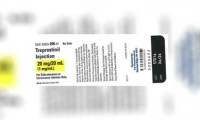-
Swedish researchers develop new AI computer model to detect lymphatic cancer
- Source: drugdu
- 377
- March 16, 2024
-
Roche partners with Cardiff researchers to uncover new research into dementia
- Source: drugdu
- 290
- March 16, 2024
-
Par Pharmaceutical Issues Recall of Single Lot of Treprostinil
- Source: drugdu
- 325
- March 15, 2024
-
Novartis Pays $90M for Molecules That Could Take STING Out of Inflammation
- Source: drugdu
- 524
- March 15, 2024
-
AbbVie’s Produodopa approved by SMC to treat Parkinson’s disease patients in Scotland
- Source: drugdu
- 535
- March 15, 2024
-
US study reveals age-related skin changes could contribute to melanoma metastases
- Source: drugdu
- 276
- March 15, 2024
-
Hengrui Medicine’s new “PARP inhibitor” HRS-1167 combination therapy for advanced solid tumors received clinical approval
- Source: drugdu
- 774
- March 15, 2024
-
FDA Seeks $7.2 Billion to Enhance Food Safety and Nutrition, Advance Medical Product Safety, and Strengthen Public Health
- Source: drugdu
- 297
- March 15, 2024
your submission has already been received.
OK
Subscribe
Please enter a valid Email address!
Submit
The most relevant industry news & insight will be sent to you every two weeks.













